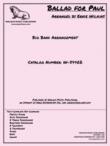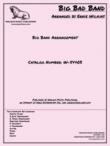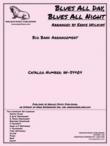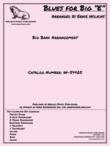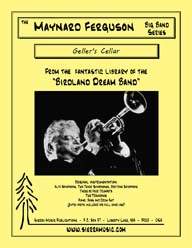Wilkins, Ernie
Ernie Wilkins was a musician, composer, conductor, and first and foremost, an arranger for almost 50 years. He was most known for being a member of the exclusive club of highly skilled and exceptionally versatile arrangers who spent significant time with the Count Basie Orchestra during his long, eventful career.
Born in St. Louis on July 20, 1922, Ernest Brooks Wilkins Jr. learned piano and violin as well as tenor saxophone, served in the military, studied music in college, and soon was playing in Earl Hines's big band. A giant of the early jazz era, Hines had recorded seminal sides with Louis Armstrong, and was a mentor to Charlie Parker, Dizzy Gillespie, and others. Dizzy said of Hines that "the modern piano came from Earl Hines" and Basie himself called him the "greatest piano player" in the world."(1) Growing up steeped in the blues followed by a stint with Hines, Wilkins by his mid-20s had developed a deep, sophisticated style which was to grow into a singular arranging ability.
Having grown up with trumpet star Clark Terry led to his being recommended to Basie (by Terry) in the early 1950s. Basie was looking for an alto player at the time and Wilkins immediately began making a historic mark.(2) He channeled his creativity through all the blues he had learned to arrange 'Every Day I Have the Blues' for young singer Joe Williams. Wilkins re-imagined the blues in his own way - a way that was especially apt for the Basie band - and it became a huge hit. The success of this arrangement led to the Basie band's return to stardom and helped Williams's career take off as well.
Wilkins's style was called "punchy" and "crackling" and "as emphatic and arresting as a series of exclamation marks."(3) Indeed. At this moment in big band history, something this fresh and intense was sure to grab a lot of notice, and fast. This was the beginning of the "New Testament" era of the Count Basie Orchestra, with Wilkins's arranging a driving force. He also famously arranged 'Two O'Clock Jump,' 'Corner Pocket,' and other key tunes for Basie. His charts were "precise and exuberant, made of interlocking riffs and strong ensemble passages" which Basie himself stated "had a lot to do with how the band began to sound."(4) He also created other new looks at songs for Williams, while his star began shining for others as well.
By this time Wilkins was in such demand that he became more of a free agent; still writing for Basie, but also writing for Dizzy Gillespie's international touring band and others, perhaps most successfully Harry James. It was said that the James band played Mr. Wilkins's style as well or better than anyone including the Basie band.(5)
Arrangers who burst upon the scene as Wilkins did usually remained in heavy demand as word traveled rather fast of the arrival of new big band arranging ideas. Wilkins worked with Tommy Dorsey, Quincy Jones, Buddy Rich, Sarah Vaughan, Dinah Washington, Maynard Ferguson, Oscar Peterson, and other A-listers as well.
During the 1960s, Wilkins, to the surprise of many, took a dark turn with a period of heroin abuse. His old friend Clark Terry, who had continued his own ascent to jazz royalty, once again came to his assistance, taking him in first in a small group, then in the Clark Terry B-A-D Band, giving Wilkins both playing and writing gigs. Wilkins used the opportunities to regain his form.(6)
Wilkins widened his reach even more as A&R head of Mainstream Records in the early 1970s, and continued to play with Terry and write for Basie throughout the decade. By the end of the 1970s, looking for new paths to conquer and encouraged by his wife, he eventually joined other American jazz greats in moving to Europe, settling in Copenhagen by 1980.
He finally decided to start his own big band, powered by fellow expatriates like Kenny Drew and Ed Thigpen, the 13-piece Almost Big Band. Wilkins played sax, conducted, and composed and arranged for the band, which recorded and performed regularly throughout the 1980s.(7)
As the 1990s dawned, his health began to fail, but he kept at music, aided by computers, maintaining the exuberant, optimistic persona that had always defined him. He passed away in his adopted Copenhagen after suffering a stroke, on June 5, 1999.
A British Guardian obituary said of his career: "Wilkins honed a jubilant, forthright style that has become something of a cliché in other hands - but in his own, it was a 1950s revelation." (8) This is how so many greats are eventually viewed - the styles they created were so powerful and successful that they were bound to be frequently emulated - though never quite duplicated.
Ernie Wilkins came from humble beginnings and worked his way to the highest peaks of American music. Raised in the blues as a young man, and working with some great musical minds, he quickly developed a singular style that was ideal for the times. His mastery of the blues gave newfound power to some of America's great big bands and singers. Minds like Wilkins's were rare, and men like Count Basie and Harry James understood quickly the regenerative power that a fresh new direction could unleash within their orchestras. Vocal and instrumental, big band and small group, Wilkins had a feel for it all, and left behind a recorded legacy that is both a triumph of one man's art while at the same time a fresh, bright direction for an entire genre of music as well.
---------------------------------------------------------------------------------------------------------------------------------------------------------------------
1-https://en.wikipedia.org/wiki/Earl_Hines
2-https://www.independent.co.uk/arts-entertainment/obituary-ernie-wilkins-1098835.html
3-https://www.theguardian.com/news/1999/jun/09/guardianobituaries.johnfordham
4-https://www.nytimes.com/1999/06/08/arts/ernie-wilkins-jazz-saxophonist-and-composer-is-dead-at-79.html
5-https://www.independent.co.uk/arts-entertainment/obituary-ernie-wilkins-1098835.html
6-https://www.independent.co.uk/arts-entertainment/obituary-ernie-wilkins-1098835.html
7-https://www.nytimes.com/1999/06/08/arts/ernie-wilkins-jazz-saxophonist-and-composer-is-dead-at-79.html
8-https://www.theguardian.com/news/1999/jun/09/guardianobituaries.johnfordham
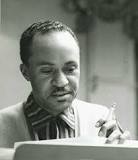
CHAIRMAN OF THE BOARD: SIX ARRANGEMENT SET
Recorded and Performed by the Count Basie Orchestra
Six Jazz Big Band Arrangements
Jazz Lines Publications and Sierra Music
CB-1002
$340.00
JOE NEWMAN SMALL GROUP FIVE ARRANGEMENT SET
Recorded by the Joe Newman Sextet/Septet/Octet
Five Jazz Sextet/Septet/Octet Arrangements
Jazz Lines Publications
JLP-1065
$180.00
JOE NEWMAN SMALL GROUP FIVE ARRANGEMENT SET [DOWNLOAD]
Recorded by the Joe Newman Sextet/Septet/Octet
Five Jazz Sextet/Septet/Octet Arrangements
Jazz Lines Publications
JLP-1065-DL
$180.00
BLUES ALL DAY, BLUES ALL NIGHT
Recorded by the Clark Terry Big Band
Jazz Big Band Arrangement
Walrus Music Publishing
W-54404
$51.00
Our Price: $48.45
BLUES ALL DAY, BLUES ALL NIGHT [DOWNLOAD]
Recorded by the Clark Terry Big Band
Jazz Big Band Arrangement
Walrus Music Publishing
W-54404-DL
$51.00
Recorded by Ernie Wilkins and His Orchestra
Jazz Big Band Arrangement
Jazz Lines Publications
JLP-5239-DL
$75.00
Recorded by Carmen McRae
Jazz Big Band Arrangement with Vocal
Jazz Lines Publications
JLP-9759
$75.00
Recorded by Carmen McRae
Jazz Big Band Arrangement with Vocal
Jazz Lines Publications
JLP-9759-DL
$75.00
CORNER POCKET (UNTIL I MET YOU)
Recorded by the Count Basie Orchestra
Jazz Big Band Arrangement
Jazz Lines Publications
JLP-7719
$75.00
CORNER POCKET (UNTIL I MET YOU) [DOWNLOAD]
Recorded by the Count Basie Orchestra
Jazz Big Band Arrangement
Jazz Lines Publications
JLP-7719-DL
$75.00
Recorded by Dizzy Gillespie
Jazz Big Band Arrangement
Jazz Lines Publications
JLP-7318-DL
$75.00
Recorded by the Count Basie Orchestra
Jazz Big Band Arrangement with Vocal
Jazz at Lincoln Center
JLC-5136
$50.00
EVERY DAY (I HAVE THE BLUES) [DOWNLOAD]
Recorded by the Count Basie Orchestra
Jazz Big Band Arrangement with Vocal
Jazz at Lincoln Center
JLC-5136-DL
$50.00


